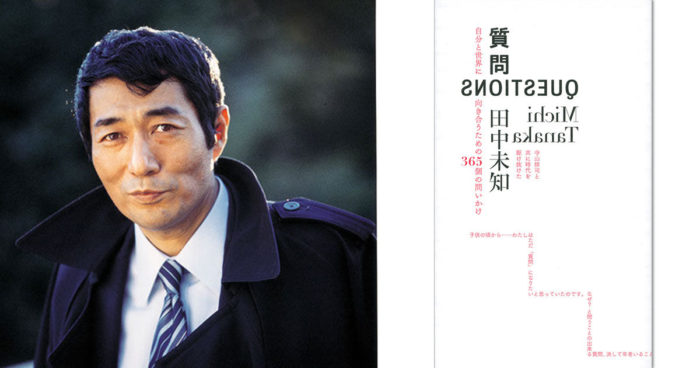How many metres can you walk with your eyes shut?
What is your favourite way to be betrayed by somebody?
Have you ever had a dream in which you had a dream?
How many dogs do you know named John?
Which question is worthy of being the last question ever asked?
Michi Tanaka’s book, Questions, was first published in 1977 and became an underground classic of the era. In 2018 it was republished by Bungei Shunju in a beautifully designed bilingual version that is available here.
Altogether, there are 365 questions, one per page, one for every day of the year. In the 2018 edition, the book can be read left-to-right in English and right-to-left in Japanese. The two languages meet in the middle.
Tanaka describes herself as “a questioner,” which is also her handle on Twitter. The purpose of her questions is to stimulate reflection, rather than elicit answers. That is why there is so much plain white space – for the reader to think in. There is no introduction nor afterword, indeed no other text within the book at all.
In content, the questions are variously paradoxical, whimsical, surreal and childish. At times they are reminiscent of zen koans, at times of the early work of Yoko Ono, particularly the bizarre ‘instructions’ in her conceptual art book, Grapefruit.
The Questions project is highly Terayama-esque, which is unsurprising since Michi Tanaka was Terayama’s personal assistant, musical collaborator and, for many years, life-partner. It is possible that he may have contributed some of the questions. Indeed, the book’s cover features an intriguing quotation from Terayama himself.
From my childhood onwards, all I wanted to become was ‘a question.’ Questions that ask ‘why’ never age, but remain fresh… Shuji Terayama.
Michi Tanaka first encountered Terayama at a book signing in 1966. She was twenty. He was thirty. He invited her to join his Tenjo Sajiki theatre group, but, an introvert, she was not cut out for the stage. Instead, she became his private secretary.
She also unveiled a talent for adding guitar accompaniment to Terayama’s poems. That led to her providing the music for Terayama’s most successful venture into the world of pop music, Toki niwa haha ga nai ko no yo ni (“Sometimes I Feel Like a Motherless Child”). Not to be confused with the American spiritual of the same name, this Europeanized folk number became a million-seller for Carmen Maki in 1969.
Tanaka went on to compose scores for six films directed by Yoichi Higashi, most notably the tense, drone-filled soundtrack for the Terayama-scripted Third (1978). Amongst the other pop successes she achieved with Terayama is this enka-style ballad sung by Mimi Hiyoshi.
In 1986, three years after Terayama’s death, Michi Tanaka left Japan for Holland without informing her acquaintances. She made a new life for herself in rural Friesland, rarely visiting Japan until recently. For most of the time, she remained aloof from the various Terayama-related events in Japan and said and wrote very little for public consumption.
In 2007, though, she did publish Terayama Shuji To Ikite (“Living with Shuji Terayama”) which is part memoir, part robust defence of Terayama, the man and artist. In particular, she rebuts the hidebound literary critics who charged Terayama with plagiarism (he was even accused of plagiarizing himself) and lack of autobiographical veracity in his poetry.
She also has harsh words for Terayama’s domineering mother and the arrogant, unsympathetic doctor in charge of his care during his final illness.
Tanaka writes movingly of his last days, attended by “the four women who loved him the most.” After the doctors had pronounced him dead, she continued to clutch his still warm corpse “believing that if I did, he would never go cold.”
As the title of the book suggests, she is still living with him now.
A habitual questioner, she ends the book with twenty five questions addressed to Terayama. Here are a few of them.
What age were you hoping to live to?
Did you have any premonition that death would suddenly come?
What were you planning to do on the day after the one in which you fell unconscious?
Do you think human beings can be made happy by words?
Can you tell me the date when you will be reborn?


